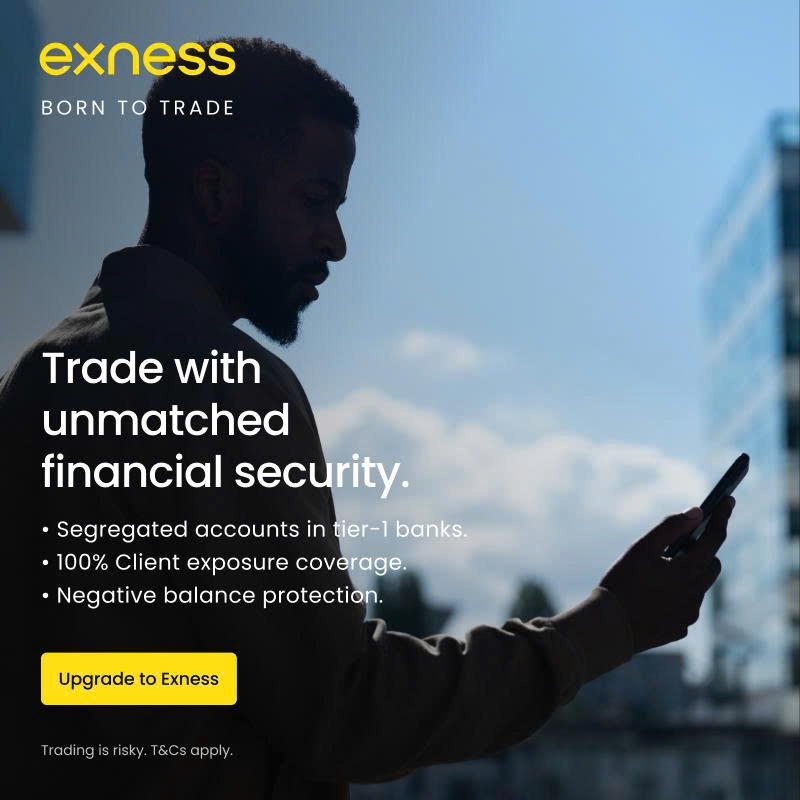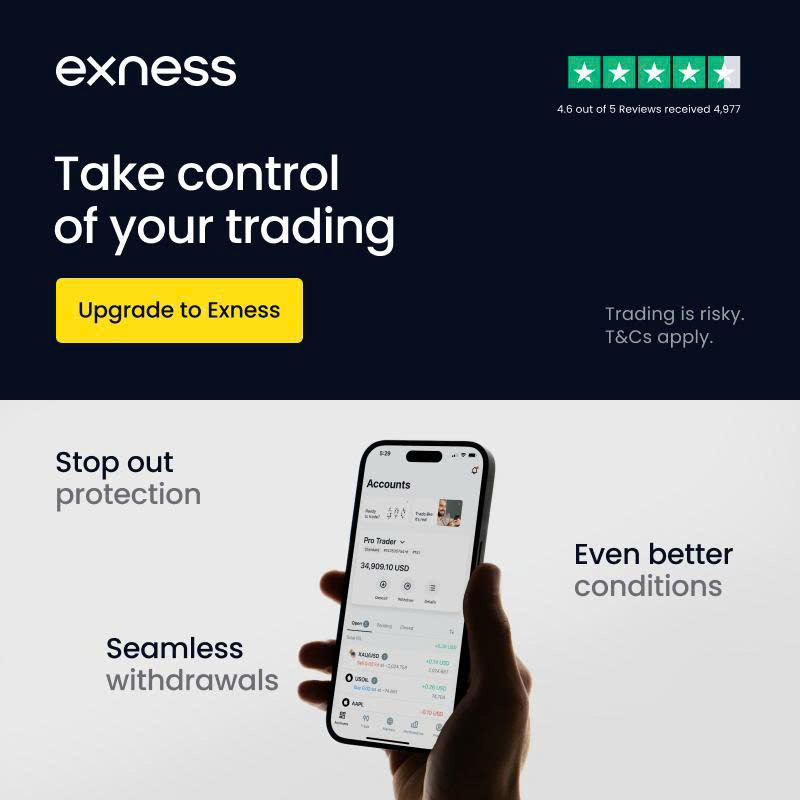
8 minute read
Exness vs Capital.com: Which Forex Broker Is Right for You in 2025?
from Exness
by Exness Blog
Choosing the right forex broker can feel like picking the perfect coffee shop—some prioritize speed, others ambiance, and everyone’s got their own taste. If you’re torn between Exness and Capital.com, you’re not alone. Both are heavyweights in the forex and CFD trading world, but they cater to different vibes. Exness is known for its ultra-low spreads and high leverage, while Capital.com shines with its user-friendly platform and AI-powered tools. So, which one’s better for you in 2025? Let’s break it down in a no-nonsense, comparing their features, fees, platforms, and more to help you decide.

✅ Trade with Exness now: Open An Account or Visit Brokers 👈
Quick Snapshot: Exness vs Capital.com
Before we dive into the details, here’s the TL;DR. Exness, founded in 2008, is a global giant with a massive $325.8 billion monthly trading turnover, offering tight spreads, leverage up to 1:2000, and robust MetaTrader integration. Capital.com, launched in 2016, is younger but packs a punch with its intuitive, AI-driven platform and top-tier regulation from FCA and CySEC. If you’re an experienced trader chasing low costs, Exness might be your jam. If you’re a beginner or love techy tools, Capital.com could be calling your name. Now, let’s get into the nitty-gritty.
Regulation and Trust: Is Your Money Safe?
When you’re handing over your hard-earned cash, trust is everything. Both brokers are legit, but their regulatory setups differ.
Exness operates under multiple regulators, including CySEC (Cyprus), FCA (UK, for professional accounts), and FSA (Seychelles). It’s also licensed in Kenya, Mauritius, and the British Virgin Islands, which gives it global reach but includes some less stringent jurisdictions like Seychelles. Exness segregates client funds, offers negative balance protection in some regions, and has a clean track record with no major scandals since 2008. That’s a solid foundation, especially for traders in emerging markets like Africa or Asia.
Capital.com keeps it tight with top-tier regulation from the FCA (UK) and CySEC (Cyprus), audited by Deloitte and backed by partnerships with major banks like Raiffeisen and RBS. Its regulatory framework is a bit more compact but screams reliability, especially for European traders. Capital.com also segregates funds and emphasizes transparency, making it a safe bet for those prioritizing strict oversight.
Verdict: Exness wins for global accessibility, but Capital.com’s top-tier FCA and CySEC licenses give it an edge for traders who value stringent regulation. If you’re in Europe, Capital.com feels like the safer pick. Outside Europe? Exness’s multi-jurisdictional setup has you covered.
Fees and Spreads: Where’s the Cheaper Deal?
Nobody wants their profits eaten by fees. Let’s see how these brokers stack up.
Exness is a low-cost king, especially for forex traders. It offers variable spreads starting at 0.3 pips on major pairs (sometimes even 0.0 on its Zero account) and no commissions on its Standard account. For its Raw Spread and Zero accounts, you’ll pay a small commission (around $3.5 per lot), but spreads are razor-tight. Exness also boasts instant withdrawals and no deposit or inactivity fees, which is a huge plus for active traders. High leverage (up to 1:2000) can amplify your gains, but be careful—it’s a double-edged sword.
Capital.com uses a fixed-spread model, with spreads starting at 0.6 pips on forex pairs. While slightly higher than Exness’s variable spreads, it’s predictable, which beginners might appreciate. There are no commissions on most trades, and like Exness, Capital.com doesn’t charge for deposits or withdrawals. However, its leverage caps at 1:30 for retail clients under FCA/CySEC rules, which is safer but less flexible than Exness’s offering.
Verdict: Exness is the go-to for cost-conscious traders, especially if you’re scalping or trading high volumes. Capital.com’s fixed spreads are great for budgeting, but its lower leverage might feel restrictive for pros.
Trading Platforms: Tools to Get the Job Done
Your trading platform is your cockpit—make sure it’s got the right controls.
Exness leans hard into MetaTrader 4 (MT4) and MetaTrader 5 (MT5), the gold standards for forex trading. These platforms are customizable, support automated trading via Expert Advisors (EAs), and integrate with TradingView for advanced charting. Exness also offers its proprietary Exness Terminal, though it lacks mobile support in some regions. If you’re a MetaTrader fan, Exness delivers a seamless, no-frills experience.
Capital.com offers its own slick, web-based platform alongside MT4. Its proprietary platform is a standout, with AI-driven trading tips, intuitive design, and a mobile app that’s a breeze to use. The AI tools analyze your trading habits to suggest improvements, which is a game-changer for beginners. Capital.com also supports TradingView integration, giving you access to top-tier charting without leaving the platform.
Verdict: Exness is perfect for MetaTrader purists who want raw power and customization. Capital.com’s proprietary platform, with its AI features and beginner-friendly interface, steals the show for those who value ease and innovation.

✅ Trade with Exness now: Open An Account or Visit Brokers 👈
Account Types and Accessibility: Who Can Jump In?
Not everyone’s got thousands to start trading, so let’s check the entry barriers.
Exness offers a range of account types to suit different traders. Its Standard account has a $1 minimum deposit (depending on payment method), making it super accessible for beginners. The Pro, Raw Spread, and Zero accounts require $200 but offer tighter spreads and faster execution for pros. Exness also provides Islamic (swap-free) accounts and supports over 40 account currencies.
Capital.com keeps it simple with a $20 minimum deposit for its standard account, which is beginner-friendly. It doesn’t have as many account types as Exness, but its one-size-fits-all approach works well for most retail traders. Like Exness, it offers Islamic accounts and a demo account with virtual funds to practice.
Verdict: Exness wins for flexibility with its low $1 entry point and diverse account options. Capital.com’s $20 minimum is still affordable, but its simpler structure might not suit advanced traders looking for tailored accounts.
Assets and Markets: What Can You Trade?
Variety is the spice of trading. Both brokers offer more than just forex, but their menus differ.
Exness covers forex, CFDs, commodities (like gold and oil), indices, cryptocurrencies, and some stocks. Its crypto offerings are a big draw for traders eyeing Bitcoin or Ethereum. However, its stock and ETF selection is limited compared to competitors.
Capital.com boasts a broader asset range, including forex, CFDs, stocks, indices, cryptocurrencies, and commodities. Its stock and CFD offerings are more extensive, making it ideal for traders who want to diversify beyond forex. The platform’s AI tools also provide market insights across these assets, which is a nice touch.
Verdict: Capital.com takes the lead for asset diversity, especially if you’re into stocks or CFDs. Exness is strong for forex and crypto but falls short on stocks and ETFs.
Education and Support: Who’s Got Your Back?
New to trading? You’ll need resources and support to avoid face-planting.
Exness offers decent educational content, including tutorials, webinars, and market analysis. Its 24/7 customer support in 15 languages (via live chat, email, and phone) is a standout, with fast response times based on user feedback. However, its educational resources aren’t as comprehensive as some competitors, which could leave beginners wanting more.
Capital.com goes all-in on education with a robust learning hub packed with articles, videos, quizzes, and AI-driven trading tips. Its demo account mirrors live market conditions, letting you practice without risking real money. Support is solid but not 24/7 like Exness, which might be a drawback for night-owl traders.
Verdict: Capital.com is the clear winner for beginners thanks to its extensive, interactive learning resources. Exness’s round-the-clock support is great, but its education needs a boost.
Who Should Choose Exness?
Exness is your pick if:
You’re an active trader who loves low spreads and high leverage (up to 1:2000).
You’re a MetaTrader fan and want a customizable, no-fuss platform.
You’re trading from emerging markets like Africa or Asia, where Exness’s localized services shine.
You want instant withdrawals and a low $1 entry point.
Real-World Example: A trader shared on a forum that they caught a market spike but miscalculated their position size. Exness’s support team jumped in fast, helping them adjust their trade and limit losses—a testament to their responsive service.
Who Should Choose Capital.com?
Capital.com is your go-to if:
You’re a beginner or intermediate trader who wants a user-friendly, AI-enhanced platform.
You value top-tier regulation (FCA, CySEC) and predictable fixed spreads.
You’re diversifying into stocks, CFDs, or indices alongside forex.
You want a killer learning hub to level up your skills.
Real-World Example: Users on review sites praise Capital.com’s AI tools for suggesting trade improvements, helping newbies avoid rookie mistakes while building confidence.
The Final Word: Exness or Capital.com in 2025?
So, Exness or Capital.com? It depends on your trading style. If you’re a seasoned trader chasing tight spreads, high leverage, and MetaTrader’s raw power, Exness is tough to beat. Its low costs and global reach make it a favorite for pros and traders in emerging markets. But if you’re new to the game, love a sleek interface, or want to trade a wide range of assets with AI insights, Capital.com is your better bet. Its beginner-friendly vibe and top-tier regulation are hard to top.
Ultimately, try their demo accounts to test the waters. Both brokers offer risk-free practice with virtual funds, so you can see which platform feels like home.
✅ Trade with Exness now: Open An Account or Visit Brokers 👈
Read more:










